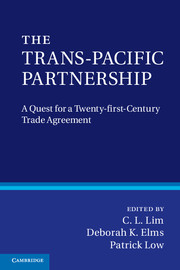Book contents
- Frontmatter
- Contents
- List of Figures and Tables
- Contributors
- Preface
- Acknowledgements
- Disclaimer
- Glossary
- Part I Introduction
- Part II The past: origins of the TPP Agreement
- Part III The present: twenty-first century elements and obstacles
- 6 Negotiations over market access in goods
- 7 TPP negotiations
- 8 Trade in services
- 9 TPP Agreement
- 10 The intellectual property chapter in the TPP
- 11 Regulatory coherence in the TPP talks
- 12 Environmental issues in the TPP
- 13 Labour standards and the TPP
- 14 What is to be done with export restrictions?
- Part IV The future: high-quality meets regional and global realities
- Part V The TPP negotiations: the quest for quality
- Index
- References
12 - Environmental issues in the TPP
Published online by Cambridge University Press: 05 November 2012
- Frontmatter
- Contents
- List of Figures and Tables
- Contributors
- Preface
- Acknowledgements
- Disclaimer
- Glossary
- Part I Introduction
- Part II The past: origins of the TPP Agreement
- Part III The present: twenty-first century elements and obstacles
- 6 Negotiations over market access in goods
- 7 TPP negotiations
- 8 Trade in services
- 9 TPP Agreement
- 10 The intellectual property chapter in the TPP
- 11 Regulatory coherence in the TPP talks
- 12 Environmental issues in the TPP
- 13 Labour standards and the TPP
- 14 What is to be done with export restrictions?
- Part IV The future: high-quality meets regional and global realities
- Part V The TPP negotiations: the quest for quality
- Index
- References
Summary
On November 12, 2011, the nine countries participating in the Trans-Pacific Partnership (TPP) negotiations agreed on a broad framework for the prospective accord, and noted what they hoped to achieve in upcoming negotiating rounds in 2012. With respect to the environment, the framework noted that TPP countries “share the view that the environment text should include effective provisions on trade-related issues that would help to reinforce environmental protection,” and that consideration would be given to establishing “an effective institutional arrangement to oversee implementation and a specific cooperation framework for addressing capacity building needs” (see USTR 2011a).
The United States has been the demandeur of the environmental negotiations, but all the participants recognize the importance of including TPP disciplines on trade-related aspects of environmental policies in support of their green growth and sustainable development goals. To that end, particular attention is being given both to the liberalization of trade in environmental goods and services (EGS) and the formulation of new rules and policy guidelines covering trans-boundary issues related to conservation, biodiversity, illegal logging and trade-related aspects of climate change policies. Such issues resonate strongly throughout the region, even though TPP countries have different priorities among those broad-ranging objectives.
- Type
- Chapter
- Information
- The Trans-Pacific PartnershipA Quest for a Twenty-first Century Trade Agreement, pp. 187 - 199Publisher: Cambridge University PressPrint publication year: 2012



